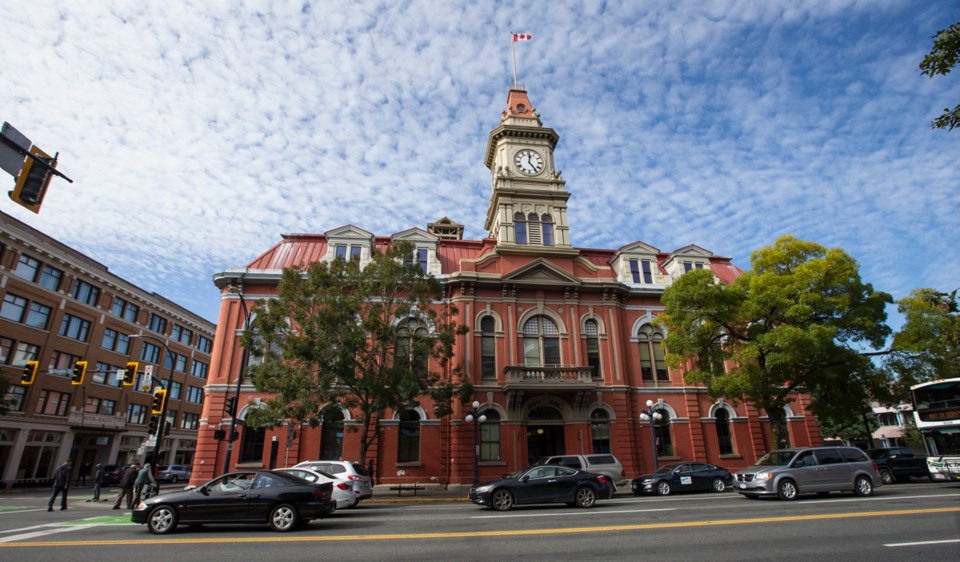Victoria city councillors are looking for alternatives to the traditional police response to mental-health and addictions issues amid worldwide protests over the death of George Floyd while in Minneapolis police custody last month.
A motion set to go to committee of the whole Thursday calls on city staff to develop a framework for an “alternative response model” in time for the 2021 budget talks.
Councillors Sarah Potts, Marianne Alto and Jeremy Loveday want staff to review programs used in other municipalities — including the Crisis Assistance Helping Out On The Streets, or CAHOOTS, model, which has been operating for 30 years in Eugene and Springfield, Oregon.
Available free of charge, 24 hours a day, CAHOOTS uses two-person teams consisting of a crisis worker and a medical technician dispatched through police departments to non-criminal crises involving addictions, homelessness and mental-health issues.
The program has gained attention across the United States and Canada in recent weeks amid calls by protesters to defund police departments and reallocate some of the money to social-service agencies.
Floyd’s death May 25 after a white Minneapolis officer pressed his knee into the Black man’s neck touched off demonstrations and discussions about systemic racism and the role of police.
Even before the protests, Victoria’s Community Wellness Task Force had identified the need for an alternative response to mental-health and addictions issues. The task force’s recommendations were scheduled to come forward in March, but its work was suspended due to the COVID-19 outbreak.
Potts said in an interview that the protests, as well as the mounting overdose deaths in B.C., have highlighted the need for a new approach.
“We know year over year, we’re spending more and more on policing, but we know we’re not having the kind of impact we should be having on communities,” Potts said. “And we know Indigenous people, Black people, people of colour, poor people, homeless people are disproportionately feeling the brunt of the way we handle community challenges.
“It’s been a long time that people have thought: ‘What if we were able to reach out to a homeless person or an Indigenous person with more appropriate care?’ If it’s a mental-health crisis, then maybe a mental-health outreach worker.”
Potts said it’s premature to say whether launching an alternative response would involve defunding the police or how the city would pay for a new program.
“The motion doesn’t expressly say that,” she said. “It’s kind of like, ‘What are the possibilities? What can we do here?’ ”
Victoria Police Chief Del Manak will wait until after Thursday’s meeting to comment, his office said Monday.
But he made his views clear last week when he appeared before council and was asked about defunding the police and redeploying resources to an alternative response.
“I don’t think that we have an option to defund the police,” he said, responding to a question from Coun. Ben Isitt. “It continues to be an underfunded profession.
“I think that additional resources are definitely needed in social services, mental-health supports and care, in education, in working with our schools and working with many other communities in many other areas.
“But my personal view on it is: Why does it have to be one or the other?”
Manak said he’s willing to have ongoing discussions about the department’s role and the community’s expectations.
“It would be great to fund some other resources to have that support, so that police aren’t the only the group that’s called to calls that perhaps could be effectively dealt with by other groups and agencies with the right level of training,” he said.
But he made clear that “more robust social-service programs” should not come at the expense of police.
Mayor Lisa Helps has expressed a willingness to look at different approaches as well, and she, too, singled out CAHOOTS as a promising option.
“It takes care of people who have mental-health and addictions challenges. It allows police to focus on police work,” she told reporters last week.
But she said any changes will hinge on resources and ensuring there are no gaps in the system when people call for help.
“So I think it’s going to be a very good conversation between Victoria city council, the police department and the province to figure out a new and better response model for mental-health calls,” she said.
“This isn’t police work. It’s become police work, because at four o’clock in the morning, if someone’s having a mental-health episode, there is no one else who will come. I think that can change.”
> Protests grow in Canada and around the world over killings of Black men, A8, A9, A11



